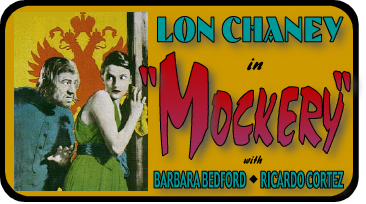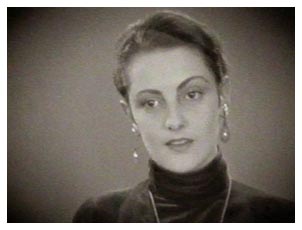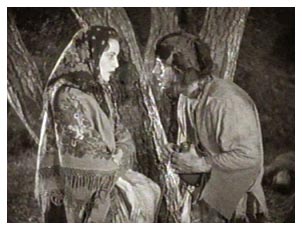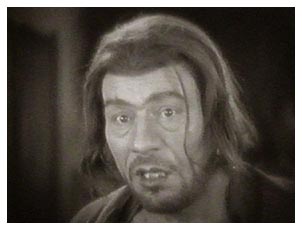

Metro-Goldwyn-Mayer
Directed by Benjamin Christensen
CAST: Lon Chaney (Sergei), Barbara Bedford (Countess Alexandrova/Tatiana),
Ricardo Cortez (The Captain/Dimitri), Charles Puffy (Ivan), Mack
Swain (Gaidaroff), Emily Fitzroy (Mrs. Gaidaroff), Kai Schmidt
(butler), John Mack Brown (uncredited extra as a Russian soldier)
During the Russian revolution in Siberia, the Countess Alexandrova
poses as a peasant to deliver orders to headquarters through unfamiliar
territory. She happens upon Sergei, a dull-witted man, who is
scavenging among dead bodies for scraps of food. She convinces
him to pose as her husband so she can get past the Bolsheviks.
However, when they stop for the evening at a remote cottage, they
are found by revolutionaries who suspect they are not married
and that she is not a peasant. They beat Sergei with a whip to
get him to talk, but he stands firm in asserting they are husband
and wife. Fortunately, soldiers are arriving, and the revolutionaries
run. Beaten and bloody, the Countess, assures him they will always
be friends. The soldiers take them to Novokursk where the Countess
delivers the secret orders and Sergei receives medical attention.
The Countess stays with a war profiteer, Gaidaroff. The Countess
arranges to get Sergei employment as domestic help in the house,
but he is brainwashed by Ivan, another domestic, who assure Sergei
things are about to change, and he will be "equal" in
station with the Countess, thus allowing him to have a romantic
 relationship with her just as the
Captain is romantically involved with her at the moment. When
the revolutionaries take over the house while the soldiers are
away fighting, Sergei sees his chance to make love to the C
relationship with her just as the
Captain is romantically involved with her at the moment. When
the revolutionaries take over the house while the soldiers are
away fighting, Sergei sees his chance to make love to the C
Lon Chaney's albatross was that he was constantly being compared against himself - having established a high level of achievement in his art that was difficult to ensure with every performance. Actually, when someone of Chaney's caliber fails to reach the level of greatness that is expected of him in a given performance, it is seldom the actor's fault - other factors are at play, as well, including the scenario, the direction, the photography, the production values, the editing and much more. More on that later . . .
Make no mistake, "Mockery" is an enjoyable film with compelling performance by Chaney; however, admittedly, it will not fare well when compared to other Chaney films such as "The Hunchback of Notre Dame" (1923), "He Who Gets Slapped" (1924), "The Phantom of the Opera" (1925), "The Unholy Three" (1925), "Tell it to the Marines" (1926) or "West of Zanzibar" (1928), among others. There are no surprises in the film. There are no great moments - however, it is a story that has suspense, emotion and action that is carried to a higher level because of Chaney's presence.
The opening scene is gruesomely realistic. From a low shot, we see Sergei's feet and his hands reaching down, searching the dead body-littered battlefield for food. He reaches into a fallen soldier's jacket and pulls out some bread and a canteen. As he drinks the water, he hears a soldier cry for a drink - hardly able to drag himself across the ground. With compassion, Sergei goes to him and tries to give him a drink from the canteen, but the soldier has died. The Countess Alexandrova (Tatiana), who is disguised as a peasant girl, watches this from the edge of the woods. His act of compassion leads her to believe she can trust him. She needs guidance to Novokursk and asks Sergei to lead her. He is reluctant at first, but agrees when she informs him she has food.
The scene later in the cottage gets the film off to an exciting
start - and very adeptly establishes the relationship between
the two main characters. The Countess is tired. She insists they
rest in the cottage thinking there is no one there. However, we
see a man climb up to the rafters to hide when he notices them
through the window. The suspense builds. The man watches from
above as the Countess sits on a bench and rests her head against
the wall,. eyes closed. He patiently waits and assesses the situation
as Sergei, very tenderly, takes off the Countess' shoes and the
cloth wrapped around her feet.  He gets
a pan of water and bathes her feet. Then he takes a fur and lays
it across a bench for a bed - picks her up and lays her on the
bench. The scene is touching, but the viewer is anxious as we
are alternately shows this scene and the unknown man viewing this
from above. Feeling confident, the man comes down and confronts
them. "He is not your husband, and your hands are too white
to be a peasant," he tells the Countess. At that moment,
some men ride up on horses - obviously revolutionaries. The leader,
a dirty-looking man wrapped in furs storms in. The man tells the
leader this man (Sergei) and woman are not what they appear to
be. The leader demands the truth and strips Sergei of his shirt
to whip him. Although his skin is being ripped as he is beaten,
Sergei, faithful to the Countess, continues to shout that she
IS his wife. Suddenly, a man runs in to report that soldiers are
on their way, and the intruders flee. The viewer is relieved,
yet the intensity of the scene and Chaney's performance leave
us somewhat exhausted.
He gets
a pan of water and bathes her feet. Then he takes a fur and lays
it across a bench for a bed - picks her up and lays her on the
bench. The scene is touching, but the viewer is anxious as we
are alternately shows this scene and the unknown man viewing this
from above. Feeling confident, the man comes down and confronts
them. "He is not your husband, and your hands are too white
to be a peasant," he tells the Countess. At that moment,
some men ride up on horses - obviously revolutionaries. The leader,
a dirty-looking man wrapped in furs storms in. The man tells the
leader this man (Sergei) and woman are not what they appear to
be. The leader demands the truth and strips Sergei of his shirt
to whip him. Although his skin is being ripped as he is beaten,
Sergei, faithful to the Countess, continues to shout that she
IS his wife. Suddenly, a man runs in to report that soldiers are
on their way, and the intruders flee. The viewer is relieved,
yet the intensity of the scene and Chaney's performance leave
us somewhat exhausted.
The key to the rest of the story is a comment (promise?) the Countess made to Sergei when she needed his guidance to get her to Novokursk. "You are going to be my friend, aren't you?" he asks. She nods. Touched, Sergei says, "I've never had a friend," to which the Countess responds, "When we get to Novokursk, we will always be friends, Sergei." As the story progresses, we see that this promise was interpreted to mean much more to Sergei than it did to the Countess.
The emotional intensity in the story comes from Sergei's dependence on the Countess' promise and the influence of Ivan, the gatekeeper (a despicable character played surprisingly well by the comedian Charles Puffy), who subscribes to the revolutionaries' mantra of the dissolution of classes and equality for all. First, when Sergei is released from the hospital after healing from the beating he incurred protecting the Countess, the goes to the home of Gaidaroff where she is staying and reminds her of the promise to always be friends. . . . and adds, "I did not know you were a Countess that time when you said you were . . . my wife." Barbara Bedford's surprised, but restrained, look when she realizes this slow-witted peasant has formed an attachment to her is perfect. At first exhibiting mild shock, then regaining her composure, she instructs one of the servants to find Sergei employment in the home thinking this may serve to repay his friendship. The story begins to build momentum, though, when we see Ivan convince Sergei that he is just as good as the Captain (Ricardo Cortez) with whom the Countess has fallen in love - AND whom Sergei has observed kissing the Countess on more than one occasion.
The climactic ending to the story is tense, exciting and
very pleasing for a rousing conclusion to this tale. The soldiers
(including the Captain) have been called away from the town to
defend Vladisk. After Sergei and Ivan have become mildly intoxicated
from drinking the Gaidaroffs' wine, two revolutionaries are let
into the house and go into the cellar below the kitchen with Ivan.
However, as he enters the trap door in the floor, Ivan looks back
at Sergei and says, "You don't go after that Countess yet.
I'm going to have her first!" Shocked, Sergei is not sure
what to do. He looks around, sees a heavy barrel and acts quickly
- slamming the trap door shut and pushing the heavy barrel end
over end on top of the door. Ivan and the other men are locked
in.
Upstairs, the Countess and the Gaidaroffs are worried because they know the mob in the street will come into the house at any moment. They determine that they must find the chauffeur and escape the town in the car. When the Countess ventures out of the room, she sees Sergei on the stairs. He chases her. She makes it to the chauffeur but finds him on the ground next to the car with a bullet in his head. Sergei finally catches up with her and says, "Sergei is not the fool any longer. Now, I am the master here! Now I am as good as any man. Now kiss me . . . like you kissed that Captain." She rises up angrily and orders him to "go downstairs where you belong." At first taken aback by the authoritarian tone, a determination takes over, and he goes to the door, shuts and locks it. Out another door, a chase ensues throughout the house which is complicated when revolutionaries enter the house. Just when all seems lost, the soldiers return to challenge the mob in the street - and the Captain, seeing revolutionaries in the house, runs to find the Countess. Fearing capture by the soldiers, Sergei hides.
At this point, it is difficult to feel sympathy for Sergei due to his actions. Chaney biographer Michael Blake said, ". . . the scenario does not produce the needed momentum to involve the audience and evoke the necessary sympathy for Sergi's character." (1) Harrison's Reports said, "Mr. Chaney again does wonderful work; but his part is extremely unsympathetic. . ." (2) However, at this point in the story, one must remember that there are several factors that should be considered regarding Sergei's behavior. First, Chaney plays a simple-minded character who is child-like in his emotions and reasoning. He has been shown kindness for the first time in his life and logically feels affection for the Countess. Also, he has been slowly "brainwashed" by Ivan that he (Sergei), too, should be able to make love to the Countess. And, finally, the "attack" by Sergei comes after Ivan has plied him with wine so that he is intoxicated.
The ending, however, brings all of this to a nice, neat resolution that we are able to accept. Once the Captain has found the Countess and her safety is ensured, a couple of the soldiers bring in a revolutionary who was shooting from a window to the Captain. As would be expected, he orders the man taken to the street and shot - apologizing to the Countess that these things must be done. Then Sergei is brought into the room having been found hiding in another part of the house. Recognizing Sergei, the Captain first asks the Countess if this man has been loyal. Once again, Bedford does a fine job of acting by looking at him first with a glare that implies disgust with his actions, and then she see the scars on his chest - the result of the beating he took earlier at the cottage protecting her. There is a softening of the features on her face as she says, "He has been very loyal. He is the only one who stayed to protect me." Sergei looks at her with disbelief as she offers a kindly smile to him. "Then I leave you to protect her again," the Captain says. to Sergei. By the way, the ending proves to be even more satisfying as Sergei is given the opportunity to prove his loyalty when Ivan and the other two men, who managed to escape when bullet holes in the barrel allowed the liquid to drain away, are disposed of by Sergei when they try to reach the Countess.
Variety was one of many who had little or nothing good to say about the film. "It would be difficult to select the factor contributing most forcefully to the ineffectiveness of the production. It's a hodge-podge mixture of half-formed ideas and emotions, morbid but not introspective enough to register as art; slightly pathetic but striking no sympathetic chord or lien of thought with which the customers would be in accord. . . Lon Chaney is put through a routine of pub-ugly mugging, but even this flops, as somehow he hardly achieves the ferocious power of facial characterization he has often managed to convey in other productions. . .The picture may be figured to draw on the strength of Chaney's box-office value the first half of the week. It lowers the star's batting average considerably." (3)
 Harrison's Reports reserved
praise for the story but did give high marks to the players. "
. . . it is masterfully produced, but it is gruesome to the point
of being repulsive. . .The only bright spot in the picture is
the presence of Miss Barbara Bedford; she takes the part of a
duchess (evidently the Czar's daughter) and a duchess she looks,
and as a duchess, she acts. . . Ricardo Cortez makes a good hero,
officer of the Russian Army. Mack Swain is very good as the Russian
peasant who has become immensely rich through war profiteering.
Emily Fitzroy is good as the rich man's wife." (4)
Harrison's Reports reserved
praise for the story but did give high marks to the players. "
. . . it is masterfully produced, but it is gruesome to the point
of being repulsive. . .The only bright spot in the picture is
the presence of Miss Barbara Bedford; she takes the part of a
duchess (evidently the Czar's daughter) and a duchess she looks,
and as a duchess, she acts. . . Ricardo Cortez makes a good hero,
officer of the Russian Army. Mack Swain is very good as the Russian
peasant who has become immensely rich through war profiteering.
Emily Fitzroy is good as the rich man's wife." (4)
The New York Times said, "Like its central character, the narrative of 'Mockery,' the latest production featuring the estimable Lon Chaney, is lumbering, dull-witted, and, on the whole, unconvincing," although adding that Chaney "looks the part." Many today, however, agree with The New York Times' reasoning for the film's lack of appeal. "The fault lies, however, with Benjamin Christensen, the director, who has frequently called for action that is more surprising than logical." (5) Jon Mirsalis is a respected Chaney historian whose website, lonchaney.org, is filled with valuable information on the star. Mirsalis echoed the reviewer's sentiments. "Much of the blame for the film rests with Christensen, a Danish director brought to the U.S. by MGM. Christensen's Danish pictures are brilliant, but his productions at MGM were misfires," he says. (6)
Chaney's films, though, would generally enjoy success based solely on his name on the marquee. The Aug. 20, 1927, issue of Film Spectator listed the rank and percentage of the motion picture audiences a specific star attracted. Lon Chaney was sixth ahead of such stars as John Gilbert, Greta Garbo, Mary Pickford and Buster Keaton. The only ones who were ahead of Chaney were Chaplin, Fairbanks, Lloyd, Valentino and Barrymore. With original working titles of "Terror" and "The Harelip," the film's worldwide gross was $751,000. (7) Shot in 33 days for only $187,000, the final profit was $318,000. (8)
As noted at the beginning of this commentary, Chaney was unfortunately held to very high expectations due to his excellent portrayals in earlier and later films. When "Mockery" was released, some of his greatest successes were behind him. No, "Mockery" is not the quality of many of Chaney's previous films, but it is an entertaining film with much to recommend it - and likely better than most other releases of the period. See it and judge for yourself.
References
1. Blake, Michael F. A Thousand Faces: Lon Chaney's Unique
Artistry in Motion Pictures. The Vestal Press, London. 1995.
2. Harrison's Reports. September 3, 1927
3. Variety, August 31, 1927
4. Harrison's Reports.
5. New York Times, August 22, 1927
6. Mirsalis, Jon C. "Mockery," http://www.lonchaney.org/filmography/148.html
(accessed 28 Dec. 2011)
7. Blake, Michael F. The Films of Lon Chaney. The Vestal Press,
London. 1998.
8. Mirsalis.
Copyright 2011 by Tim Lussier. All rights reserved